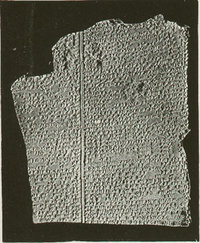Epic of Gilgamesh
|
|
The Epic of Gilgamesh is from Babylonia, dating from long after the time that king Gilgamesh was supposed to have ruled. It was based on earlier Sumerian legends of Gilgamesh. The most complete version of the epic was preserved on eleven clay tablets in the collection of the 7th century BCE Assyrian king Ashurbanipal.
| Contents |
History
The earliest Akkadian versions of the epic are known, from its incipit, as surpassing all other kings and dates back to the first half of the second millennium BCE The "standard" version, carrying the incipit He who saw the deep, was composed by Sin-liqe-unninni sometime between 1300 BCE and 1000 BCE
The earliest Sumerian (Sumer is one of the oldest civilizations, originating in the Mesopotamian river valley) versions of the texts date from as early as the third dynasty of Ur (2100 BCE-2000 BCE), or to about 400 years after the supposed reign of the historical Gilgamesh.
A twelfth tablet sometimes appended to the remainder of the epic represents a sequel to the original eleven continuing the epic added at a later date. This tablet has commonly been omitted until recent years, as it is in a different style and is out of sequence with the rest of the tablets (Enkidu is still alive), and is considered a separate work (though some charge it was due to supposed references of homosexuality between Gilgamesh and Enkidu).
The Epic of Gilgamesh is widely known today. The first modern translation of the epic was in the 1870s by George Smith. More recent translations include one undertaken with the assistance of the American novelist John Gardner, and published in 1984. Another edition is the two volume critical work by Andrew George whose translation also appeared in the Penguin Classics series in 2003. In 2004, Stephen Mitchell released a controversial edition, which is his interpretation of previous scholarly translations into what he calls the "New English version".
A film adaptation titled Gilgamesh is currently in the pre-production stages. It is being directed by Roger Christian (director of Battlefield Earth), stars Max Ryan as Gilgamesh, and Kenan Imirzalioglu as Enkidu.
Contents of the eleven clay tablets
Gilgamesh_Enkidu_cylinder_seal.jpg
- Introducing Gilgamesh of Uruk, the greatest king on earth, two-thirds god and one-third human, the strongest super-human who ever existed. But his people complain that he is too harsh, so the sky-god Anu creates the wild-man Enkidu, a worthy rival as well as distraction. Enkidu is tamed by the seduction of a female harlot Shamhat.
- Enkidu challenges Gilgamesh. After a mighty battle, Gilgamesh breaks off from the fight (this portion is missing from the Standard Babylonian version but is supplied from other versions) and some scholars argue that they even become lovers. Gilgamesh proposes an adventure in the cedar forest to kill a demon.
- Preparation for the adventure of the cedar forest; many give support, including the sun-god Shamash.
- Journey of Gilgamesh and Enkidu to the cedar forest.
- Gilgamesh and Enkidu, with help from Shamash, kill Humbaba, the demon guardian of the trees, then cut down the trees which they float as a raft back to Uruk.
- Gilgamesh rejects the sexual advances of the goddess Ishtar. Ishtar gets her father, the sky-god Anu, to send the "Bull of Heaven" to avenge the rejected sexual advances. Gilgamesh and Enkidu kill the bull.
- The gods decide that somebody has to be punished for killing the Bull of Heaven, and it is Enkidu. Enkidu becomes ill and describes the Netherworld as he is dying.
- Lament of Gilgamesh for Enkidu.
- Gilgamesh sets out to avoid Enkidu's fate and makes a perilous journey to visit Utnapishtim and his wife, the only humans to have survived the Great Flood who were granted immortality by the gods, in the hope that he too can attain immortality. Along the way, Gilgamesh encounters the "ale-wife" Siduri who attempts to dissuade him from his quest.
- Completion of the journey, by punting across the Waters of Death with Urshanabi, the ferryman.
- Gilgamesh meets Utnapishtim, who tells him about the great flood and gives him two chances for immortality. First he tells Gilgamesh that if he can stay awake for six days and seven nights he will become immortal. Gilgamesh fails, but Utnapishtim decides to give him another chance. Utnapishtim tells Gilgamesh that if he can obtain a plant from the bottom of the sea and eat it he will become immortal. Gilgamesh obtains the plant, but it is stolen by a snake. Gilgamesh, having failed both chances returns to Uruk, where the sight of its massive walls provoke Gilgamesh to praise this enduring work of mortal men.
External links
- http://www.wsu.edu/~dee/MESO/GILG.HTM
- The Epic of Gilgamesh: A Spiritual Biography (http://www.theosophy-nw.org/theosnw/world/mideast/mi-wtst.htm)
- Sumerian texts: ETCSL (http://etcsl.orinst.ox.ac.uk/cgi-bin/etcslmac.cgi?text=c.1.8.1*)
- Gilgamesh and Huwawa (http://www-etcsl.orient.ox.ac.uk/section1/tr1815.htm), version A - (the adventure of the cedar forest)
- Gilgamesh and Huwawa (http://www-etcsl.orient.ox.ac.uk/section1/tr18151.htm), version B
- Gilgamesh and the Bull of Heaven (http://www-etcsl.orient.ox.ac.uk/section1/tr1812.htm)
- Gilgamesh and Aga (http://www-etcsl.orient.ox.ac.uk/section1/tr1811.htm)
- Gilgamesh, Enkidu and the nether world (http://www-etcsl.orient.ox.ac.uk/section1/tr1814.htm)
- The death of Gilgamesh (http://www-etcsl.orient.ox.ac.uk/section1/tr1813.htm)
- Information on the film version (http://www.imdb.com/title/tt0404985)
Translations for several legends of Gilgamesh in the Sumerian language can be found in Black, J.A., Cunningham, G., Fluckiger-Hawker, E, Robson, E., and Zólyomi, G., The Electronic Text Corpus of Sumerian Literature (http://www-etcsl.orient.ox.ac.uk/), Oxford 1998-.
Bibliography
da:Digtet om Gilgamesh de:Gilgamesch-Epos eo:Eposo pri Gilgameŝ fr:Gilgamesh ko:길가메시 서사시 is:Gilgamesharkviða he:עלילות גלגמש ku:Gilgameş nl:Gilgamesh-epos ja:ギルガメシュ叙事詩 pl:Epos o Gilgameszu pt:Epopéia de Gilgamesh ru:Эпос о Гильгамеше fi:Gilgamesh sv:Gilgamesheposet sr:Гилгамеш

